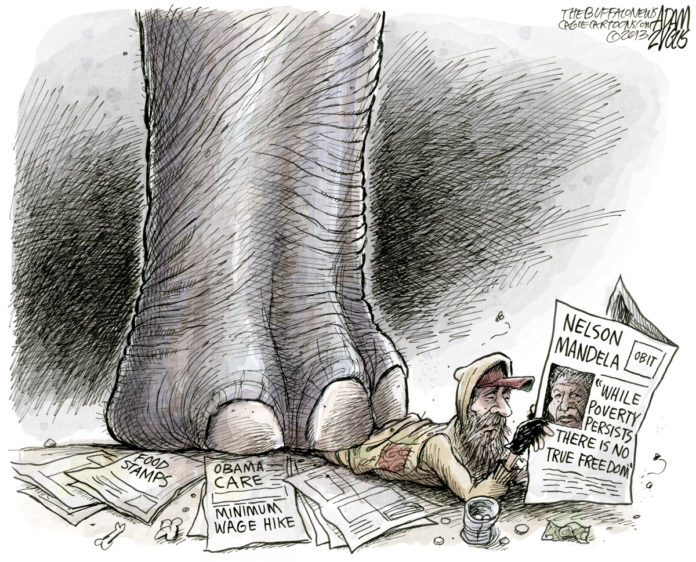BY DON NELSON
Current events often trigger my thought. We have lost a significant human being in Nelson Mandela. He fought against Apartheid in his homeland. He motivated change over the years and succeeded in toppling a government built upon the principle of “being a part.” The form of government he opposed is no longer – but the idea lives on in the minds and hearts of those who still long for a separated population.
Apartheid, as it manifested itself in South Africa, was a separation of the races by force of government. However, it is not limited to race. It is a mind set that longs for separation. It includes the xenophobia that drives the Tea Party in our country. It shows itself in the class warfare that is evidenced in the struggle for a living wage.
I could go off on a angry rant regarding those that selfishly and self righteously complain that they spent years earning a college degree to enter the field of education or the health care field and they earn at a level comparable to what those working in the “fast food” industry, the “domestic laborers and others in the hotel/motel workers group” are trying to get.
It seems that the argument is, I worked my butt off getting my degree to teach or work in the healthcare industry and it pisses me off that these “burger flippers” want to make what I am.
Yeah, it would be real easy to go off on the objective self interest – selfishness – that certain people exhibit. But I want to take a different approach.
Every human being has the right to as comfortable and secure a life as they can create. Some do it at the top of the food chain. They live comfortably off of the profits that are generated by those that work for them. Some have fulfilled requisite educational requirements and secured employment in service sector jobs and have learned to budget and conserve and provide lodging, clothing and food for themselves and their families.
Some have moved from one occupation, for which they were educated, into another career choice unrelated to that education. They, too, work, budget and conserve in order to provide the necessities for their families. It is what they have become accustomed to and they do not want for necessities.
One would think that all of the above would be positively disposed toward anyone desiring the resources to move toward a more comfortable and secure life. Those that currently work at minimum wage – $7.50 or $7.75 an hour can scarcely afford to pay the rent and buy food. Having to prioritize realities such as shelter, clothing, food, transportation, child care and health care are not within the realm of daily existence for many. Things that most service sector workers take for granted and deal with daily are often beyond the reach of those living at or below the poverty level.
Personally, I am not at ease with the awareness that the people that “serve” me, see to my needs daily, are barely able to take care of themselves.
I find it ironic that the very people that ought to be assisting others to rise above their current situation are the very people who want to keep them down – down where they can continue to “look down” on them, feel somehow superior to them because they have worked their butts off to get a college degree.
That college degree is not a pass to fame and fortune and higher status – it is evidence that the one holding it can and wants to learn.
Yet in many cases it seems that the “can” out weighs the desire because there is little attempt to learn life’s lessons regarding their fellow human beings and how they can reach out and assist.
Booker T. Washington was a great example of a person who started out humbly and sought to assist those less fortunate than himself. He said, “One man cannot hold another man down in the ditch without remaining down in the ditch with him.” And again, he said, “There are two ways of exerting one’s strength: one is pushing down, the other is pulling up.”
Rather than whine and complain about the perceived unfairness of someone less educated being paid a living wage similar to what one is earning as the result of earning a degree, it would seem a better witness to humanity to support those seeking a higher dollar amount in the paycheck they earn.
I started out mentioning Apartheid – “being a part from” – and it seems to me that one aspect of our “Apartheid” is the desire to remain separate in earning power, to feel justified in superiority because of higher education, the maintaining of a tribal outlook that says, “I belong to a better class of people because I am educated and because I’ve earned the right to belong.”
It is my opinion that no one has any status greater or more lofty than anyone else. Class distinctions do not create a better life for anyone. Class distinctions are descriptors that have been created by those that need the security of belonging. Class distinctions do not seek to lift anyone up – they are by definition the boots with which those on top seek to stomp down those below them.
So, rather than exuding a selfishness that reeks of bigotry and hatred, it is far better to work to change the social norms that make class distinction necessary. Live a life that works toward betterment for all.
– Don Nelson lives in Lawton, OK and is a frequent contributor to The Oklahoma Observer







